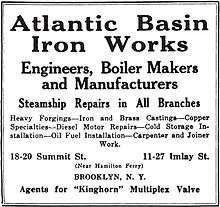Atlantic Basin Iron Works
The Atlantic Basin Iron Works was a ship repair and conversion facility that operated in Brooklyn, New York, from the late 19th to the mid-20th century. It converted numerous ships to military use in World War II.

Founded before 1910,[1] the yard had its headquarters at 18–20 Summit Street.[2] By 1920, the yard was known for its construction and repair of oil-fired boilers, diesel engines, and refrigeration units.[2]
In World War II the company specialized in ship conversion and repair, and like most US shipyards at the time, it was heavily contracted for work by the United States Army, United States Navy and United States Maritime Commission.
In 1941–42 the company converted the 9,300-ton passenger and cargo steamship Rio Parana into the British Royal Navy escort carrier HMS Biter.[3]
The company's owner, Bernard A. Moran, was strongly anti-union and had defied attempts by the CIO's Marine and Shipbuilding Workers Union to secure a contract with the company since November 1938. His approach became problematic in the war after President Franklin D. Roosevelt's War Labor Board ordered Moran under its broad war powers to sign a union security (maintenance-of-membership) contract. In spite of warnings that he might lose all his government contracts or have his company seized, Moran remained intransigent, and after three months of legal wrangling, the government made good on its threat and seized the company in September 1943, taking direct control of its management.
In 1947–48 the shipyard converted the 20,614-gross register ton (GRT) troopship USAT Brazil back into the Moore-McCormack Lines ocean liner SS Brazil.[4] It was the largest peacetime conversion the yard had yet undertaken, and cost $9 million.[4]
The western part of the site was used later for the Brooklyn Cruise Terminal.
Notes
- Blue Book of American Shipping. The Penton Publishing Company. 1910.
- Weiss, George; Leonard, J.W. (1920). America's Maritime Progress. New York: The New York Marine News Company. pp. 343, 497.
- "A history of HMS Biter". Royal Navy Research Archive. July 2008. Archived from the original on 4 March 2009. Retrieved 2 February 2009.
- Vinson, Bill; Casey, Ginger Quering. "S.S. Brazil". Welcome Aboard Moore-McCormack Lines. Retrieved 21 May 2013.
References
- LeRoy, Professor Michael H. "Compulsory Labor in a National Emergency" (PDF). University of Illinois. Archived from the original (PDF) on 2010-06-14.
- "Protest in Brooklyn". Time. July 23, 1943.
- "WLB Crackdown". Time. September 6, 1943.
- "Obituary for yard worker". Brooklyn Daily Standard Union. 8 October 1918.